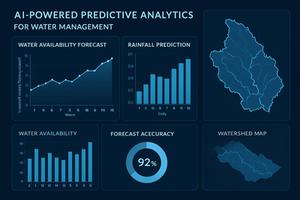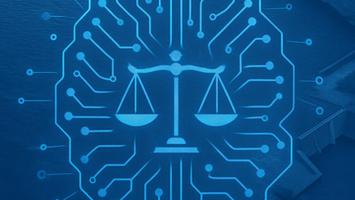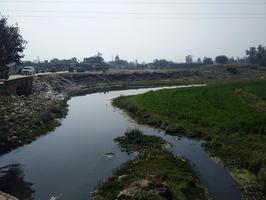The Ethics of AI in Water Management
- By
- Gitanjali Maggo
- June-03-2025
As we increasingly integrate Artificial Intelligence (AI) into water management systems, we must carefully consider the ethical implications of these technologies. While AI offers tremendous potential for improving water efficiency, quality monitoring, and resource allocation, it also raises important questions about equity, privacy, transparency, and accountability. At Pani Ki Kahani, we believe that responsible deployment of AI in water management requires thoughtful attention to these ethical dimensions.
Water is not merely a resource; it is a fundamental human right and a shared commons. How we apply AI to manage this precious resource must reflect these values and ensure that technological solutions serve the broader public good, particularly for marginalized communities who often face the greatest water challenges.
Key Ethical Considerations
Several critical ethical issues arise when implementing AI in water management:
1. Equity and Access
AI systems can potentially exacerbate existing inequalities in water access if not carefully designed and implemented:
- Algorithmic Bias: If AI models are trained on historical data that reflects existing inequities in water distribution, they may perpetuate or even amplify these disparities. For example, an AI system optimizing water allocation might prioritize areas with more extensive historical data (typically wealthier regions) over underserved communities with limited data.
- Digital Divide: Communities with limited access to technology, internet connectivity, or technical expertise may be unable to benefit from AI-enhanced water management systems, creating a new dimension of water inequality.
- Affordability: If AI-driven water management leads to increased costs that are passed on to consumers, it could make water less affordable for vulnerable populations.
Ethical AI implementation must explicitly address equity concerns by ensuring that benefits reach all communities, particularly those historically underserved. This might involve targeted deployment in high-need areas, subsidies for low-income users, and community capacity building.
2. Privacy and Data Governance
AI systems rely on data, including potentially sensitive information about water usage patterns that could reveal personal behaviors:
- Household Water Usage: Smart meters and sensors can collect detailed data about when and how individuals use water in their homes, raising privacy concerns.
- Agricultural Practices: Monitoring of irrigation patterns could reveal proprietary farming practices or financial information about agricultural operations.
- Data Ownership: Questions arise about who owns the data collected from public water bodies or community water systems, and how this data can be used.
Ethical approaches include clear data governance frameworks, transparent privacy policies, appropriate anonymization techniques, and ensuring that data collected for water management isn't repurposed for surveillance or commercial exploitation without consent.
3. Transparency and Explainability
Many AI algorithms, particularly deep learning models, function as "black boxes" where the reasoning behind decisions isn't easily understood:
- Decision Accountability: When AI systems make or recommend decisions about water allocation during scarcity, the basis for these decisions should be understandable and justifiable.
- Public Understanding: Communities affected by AI-driven water management have a right to understand how these systems work and influence their water access.
- Scientific Validation: The models and assumptions underlying AI predictions about water availability, quality, or flood risks should be open to scientific scrutiny.
Ethical AI implementation requires appropriate levels of transparency, including documentation of data sources, model limitations, and decision criteria. While complete technical transparency may not always be possible or necessary, affected communities should have access to meaningful explanations of how AI systems impact their water resources.
4. Autonomy and Human Oversight
As AI systems become more sophisticated, questions arise about the appropriate balance between automation and human decision-making:
- Critical Decisions: Should AI systems be allowed to make autonomous decisions about water allocation during droughts, or should these always require human approval?
- Emergency Responses: How much autonomy should AI systems have in responding to water emergencies like contamination events or flood threats?
- Community Voice: How can we ensure that increased automation doesn't diminish community input into water governance?
Ethical frameworks typically advocate for "human-in-the-loop" approaches for consequential decisions, where AI provides recommendations but humans retain oversight and final authority, particularly for decisions with significant social impacts.
5. Reliability and Safety
Water is essential for life, making the reliability and safety of AI systems in water management particularly critical:
- System Failures: AI systems controlling water infrastructure must be robust against failures that could disrupt water supply or compromise water quality.
- Security Vulnerabilities: As water systems become more connected and automated, they may become targets for cyberattacks, requiring strong security measures.
- Resilience: AI systems should be designed to function effectively even in unusual or unexpected conditions, such as extreme weather events or power outages.
Ethical implementation includes rigorous testing, redundant systems, regular security audits, and contingency planning to ensure that AI enhances rather than compromises water security.
Ethical Frameworks for AI in Water Management
At Pani Ki Kahani, we advocate for a comprehensive ethical framework that addresses these considerations through several key principles:
1. Inclusive Design and Deployment
AI systems should be designed with input from diverse stakeholders, including representatives from marginalized communities, to ensure they address varied needs and perspectives. Deployment should prioritize areas with the greatest water challenges, not just those with the most resources or data.
2. Rights-Based Approach
AI implementation should explicitly recognize and support the human right to water, ensuring that technological solutions enhance rather than undermine equitable access to safe, affordable water for all.
3. Contextual Appropriateness
AI solutions should be adapted to local contexts, respecting cultural practices, traditional knowledge, and existing governance structures around water. One-size-fits-all technological solutions rarely succeed in the complex social and environmental contexts of water management.
4. Participatory Governance
Communities affected by AI-driven water management should have meaningful opportunities to participate in decision-making about how these systems are designed, deployed, and evaluated. This includes accessible mechanisms for feedback, grievance redress, and ongoing dialogue.
5. Adaptive Management
Ethical implementation requires ongoing monitoring of AI systems' impacts, with mechanisms to adjust or even discontinue approaches that prove harmful or inequitable. This includes regular ethical audits and impact assessments.
"Technology is never neutral. The question is not whether to use AI in water management, but how to use it in ways that promote justice, sustainability, and human flourishing."
Case Study: Ethical AI in Drought Management
Our work in drought-prone regions of Maharashtra illustrates these principles in practice. When developing an AI system to optimize water allocation during scarcity, we:
- Conducted extensive community consultations to understand local water needs, priorities, and existing allocation practices
- Ensured the algorithm explicitly prioritized basic household water needs over other uses
- Developed a transparent allocation framework that communities could understand and modify
- Created a dual-approval system where AI recommendations required validation by local water committees
- Implemented special provisions to protect smallholder farmers and other vulnerable groups
- Established a feedback mechanism for communities to report concerns about the system's decisions
- Conducted regular equity audits to assess whether the system was benefiting all community members
This approach has resulted in more equitable water distribution during drought periods while maintaining community ownership of the process.
The Path Forward
As AI becomes increasingly integrated into water management, we must ensure that ethical considerations are not an afterthought but are central to how these technologies are developed and deployed. This requires:
- Ethical Guidelines: Development of specific ethical guidelines for AI in water management, adapted to different contexts
- Capacity Building: Training for water professionals, technologists, and community leaders on ethical dimensions of AI
- Regulatory Frameworks: Appropriate oversight mechanisms to ensure AI applications in water management meet ethical standards
- Research: Ongoing study of the social impacts of AI in water management to inform better practices
- Multi-stakeholder Dialogue: Sustained conversation between technologists, water managers, communities, ethicists, and policymakers
At Pani Ki Kahani, we are committed to advancing the ethical use of AI in water management through our projects, partnerships, and advocacy. We believe that technology should serve human values and needs, particularly when it comes to something as essential as water. By thoughtfully addressing the ethical dimensions of AI in water management, we can harness its potential while ensuring that the benefits flow to all, especially those most in need.






































































